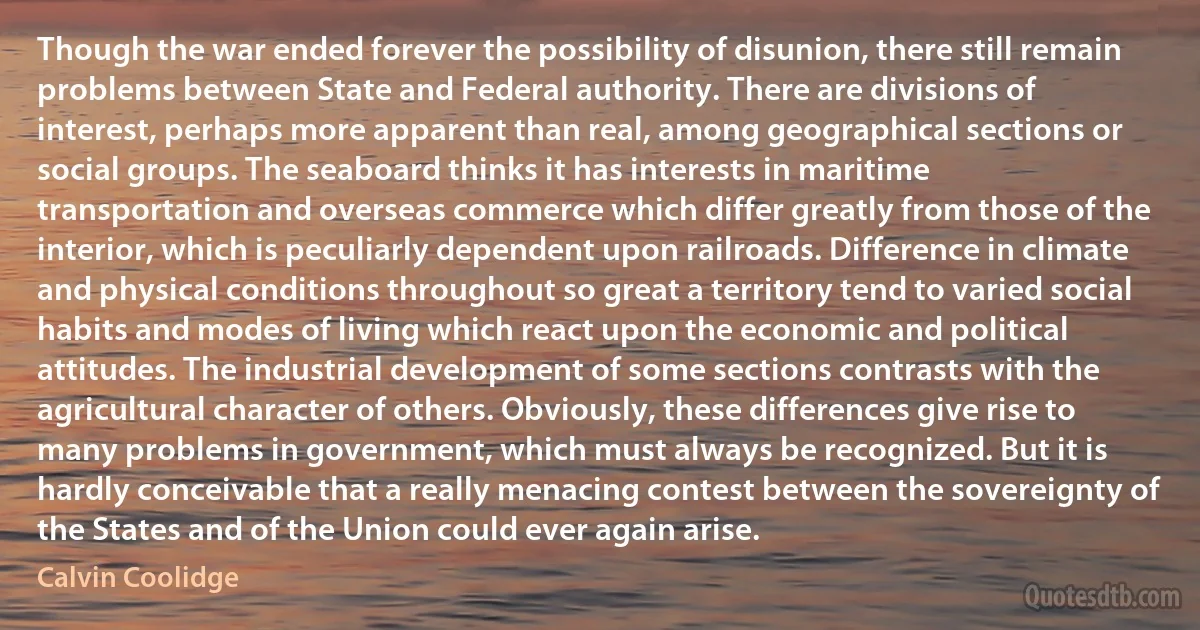
Though the war ended forever the possibility of disunion, there still remain problems between State and Federal authority. There are divisions of interest, perhaps more apparent than real, among geographical sections or social groups. The seaboard thinks it has interests in maritime transportation and overseas commerce which differ greatly from those of the interior, which is peculiarly dependent upon railroads. Difference in climate and physical conditions throughout so great a territory tend to varied social habits and modes of living which react upon the economic and political attitudes. The industrial development of some sections contrasts with the agricultural character of others. Obviously, these differences give rise to many problems in government, which must always be recognized. But it is hardly conceivable that a really menacing contest between the sovereignty of the States and of the Union could ever again arise.
Calvin CoolidgeRelated topics
agricultural authority character climate development difference disunion federal forever geographical government great industrial interest interior living menacing perhaps possibility react real remain rise seaboard sovereignty state transportation war others divisions statesRelated quotes
I hope none who hear me will confound this expression of mine with advocacy of the right of a state to remain in the Union, and to disregard its constitutional obligations by the nullification of the law. Such is not my theory. Nullification and secession, so often confounded, are indeed antagonistic principles. Nullification is a remedy which it is sought to apply within the Union, and against the agent of states. It is only to be justified when the agent has violated his constitutional obligation, and a state, assuming to judge for itself, denies the right of the agent thus to act, and appeals to the other states of the Union for a decision; but when the states themselves, and when the people of the states, have so acted as to convince us that they will not regard our constitutional rights, then, and then for the first time, arises the doctrine of secession in its practical application.

Jefferson Davis
It has been said, that the people had already surrendered all their powers to the State sovereignties, and had nothing more to give. But, surely, the question whether they may resume and modify the powers granted to government does not remain to be settled in this country. Much more might the legitimacy of the general government be doubted, had it been created by the States. The powers delegated to the State sovereignties were to be exercised by themselves, not by a distinct and independent sovereignty, created by themselves. To the formation of a league, such as was the confederation, the State sovereignties were certainly competent. But when, "in order to form a more perfect union," it was deemed necessary to change this alliance into an effective government, possessing great and sovereign powers, and acting directly on the people, the necessity of 'referring it to the people, and of deriving its powers directly from them, was felt and acknowledged by all.

John Marshall
The new year of 1854 found slavery excluded from more than half the States by State constitutions, and from most of the national territory by congressional prohibition. Four days later commenced the struggle which ended in repealing that congressional prohibition. This opened all the national territory to slavery, and was the first point gained. But, so far, Congress only had acted; and an indorsement by the people, real or apparent, was indispensable to save the point already gained and give chance for more. This necessity had not been overlooked; but had been provided for, as well as might be, in the notable argument of "squatter sovereignty," otherwise called "sacred right of self government," which latter phrase, though expressive of the only rightful basis of any government, was so perverted in this attempted use of it as to amount to just this: That if any one man, choose to enslave another, no third man shall be allowed to object.

Abraham Lincoln
The old form of trade union, which was born in the nineteenth century and aimed primarily at negotiating wages for a specific trase is no longer sufficient. First of all, as we have been argueing, the old trade unions are not able to represent the unemployed, the poor, or even the mobile and flexible post-Fordist workers with short term contracts, all of whom participate actively in social production and increase social wealth. Second, the old unions are divided according to the various products and tasks defined in the heyday of industrial production - a miners' union, a pipefitters' union, a machinists' union and so forth. Today, insofar as the conditions and the relations of labor are becoming common, these traditional divisions (or even newly defined divisions) no longer make sense and serve only as an obstacle. Finally the old unions have become purely economic, not political, organization.

Antonio Negri
In these days little need exists for extolling the blessings of our Federal Union. Its benefits are known and recognized by all its citizens who are worthy of serious attention. No one thinks now of attempting to destroy the Union by armed force. No one seriously considers withdrawing from it. But it is not enough that it should be free from attack - it must be approved and supported by a national spirit. Our prime allegiance must be to the whole country. A sentiment of sectionalism is not harmless because it is unarmed. Resistance to the righteous authority of Federal law is not innocent because it is not accompanied by secession. We need a more definite realization that all of our country must stand or fall together, and that it is the duty of the Government to promote the welfare of each part and the duty of the citizen to remember that he must be first of all an American.

Calvin Coolidge
